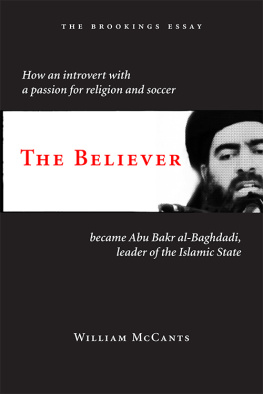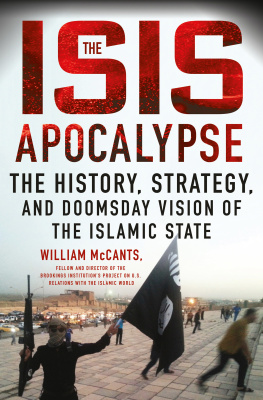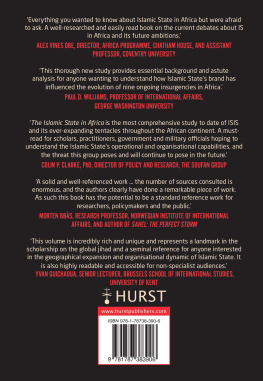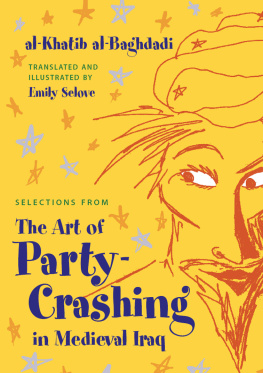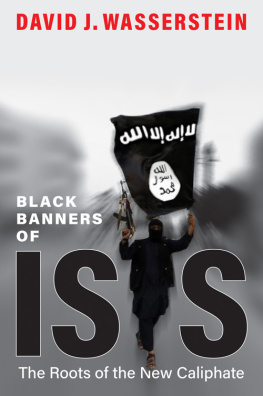IBRAHIM AWWAD IBRAHIM AL-BADRI was born in 1971 in Samarra, an ancient Iraqi city on the eastern edge of the Sunni Triangle north of Baghdad. The son of a pious man who taught Quranic recitation in a local mosque, Ibrahim himself was withdrawn, taciturn, and, when he spoke, barely audible. Neighbors who knew him as a teenager remember him as shy and retiring. Even when people crashed into him during friendly soccer matches, his favorite sport, he remained stoic. But photos of him from those years capture another quality: a glowering intensity in the dark eyes beneath his thick, furrowed brow.
Early on, Ibrahims nickname was The Believer. When he wasnt in school, he spent much of his time at the local mosque, immersed in his religious studies; and when he came home at the end of the day, according to one of his brothers, Shamsi, he was quick to admonish anyone who strayed from the strictures of Islamic law.
Now Ibrahim al-Badri is known to the world as Abu Bakr al-Baghdadi, the ruler of the Islamic State or ISIS, and he has the power not just to admonish but to punish and even execute anyone within his territories whose faith is not absolute. His followers call him Commander of the Believers, a title reserved for caliphs, the supreme spiritual and temporal rulers of the vast Muslim empire of the Middle Ages. Though his own realm is much smaller, he rules millions of subjects. Some are fanatically loyal to him; many others cower in fear of the bloody consequences for defying his brutal version of Islam.
Since Baghdadis sudden emergence from obscurity in 2014 as the monster who ordered and broadcast on YouTube the beheading and even burning alive of those he deemed his enemies, news articles and books have traced his radicalization back to the U.S. invasion of Iraq in 2003. Although the American invasion fed the fire and enabled it to spread, in fact, his radicalization began much earlier, ignited by an unlikely but highly volatile mixture of fundamentalism, Saddam Husseins secular totalitarianism, and his own need to control others.
Baghdadis lower middle-class family was known for its piety but also for its proud lineage. His Sunni forefathers claimed to descend from the Prophet Muhammad through the Shiite leaders buried in Samarras golden-domed shrine. Baghdadis lineage is one instance of the many overlapping religious identities in Iraq that belie the supposedly eternal divide between Sunnis and Shiites. Al-Qaida would bomb the shrine years later after the American invasion in an effort to make that divide a reality.
The family patriarch, Baghdadis father Awwad, was active in the religious life of the community. It was at the mosque where his father taught that the teenaged Baghdadi got his own start as a teacher, leading neighborhood children in chanting the Quran. This was his first experience with oratory and religious instruction. When reciting the scripture, a revered vocation in Islam, Baghdadis quiet voice would come to life, pronouncing the letters in firm, reverberating tones. He devoted countless hours to mastering the subtleties of the art.
Despite the religiosity of Baghdadis family, some of its members joined the Baath Party, a socialist organization dedicated to the goal of pan-Arab union. Although Baathist leaders tolerated and sometimes even encouraged private devotion as an outlet for religious fervor, they were wary of religious activism as a threat to their rule. Baathism had dominated Iraqi politics and the machinery of state since the late 1960s, so citizens who wanted government jobs had to join the party regardless of their personal convictions.
Two of Baghdadis uncles served in Saddams security services, and one of his brothers became an officer in the army. Another brother who served in the military died during the grueling eight-year war that Iraq fought against Iran in the 1980s with tacit U.S. support. Baghdadi might well have shared that fate had the war continued a little longer and his near-sightedness not disqualified him from military service.
Baghdadis family is representative in many ways of the diversity of influences and ever-shifting allegiances that were required for survival in Saddam Husseins Iraq. Not only did they have ties to the Baathist party, if only for practical purposes, but there is evidence that several of Baghdadis family members, perhaps even his father, were Salafisadherents of an extreme, puritanical form of Sunni Islam widely practiced in Saudi Arabia and throughout much of the Middle East, including Iraq, where it has deep roots. Muhammad ibn Abd al-Wahhab, the founder of the Saudi strain of Salafism, supposedly studied in the Iraqi city of Mosul in the 18th century, and individual Salafi missionaries spread their beliefs throughout Iraq in the 20th.
Most Salafis preach obedience to Muslim rulers, even bad ones, but Saddam viewed the Salafis as a threat because they condemn secularism and want states to impose Islamic law. So when the Salafis in Iraq began to organize themselves into societies to further their missionary work in the late 1970s, Saddam put them in jail for forming illegal organizations. He backed off in the 1980s during the war with Shiite Iran because he needed to retain the support of Iraqs Sunni minority, which includes the Salafis. But in 1990, two years after the war with Iran ended, Saddam pressured thousands of Salafis to sign a pledge not to convert other Iraqis to their cause.
Around the same time, Saddam sought to co-opt his devout subjects by founding in 1989and naming in his own honorthe Saddam University for Islamic Studies. The university was but one of the many ways he attempted to use religion to strengthen his hold on Iraqi society. As part of what he called his Faith Campaign, which began in 1993, he tried to woo religious conservatives by closing nightclubs, forbidding public consumption of alcohol, and imposing some of the harsh penalties prescribed by Islamic scripture such as severing a hand or foot for theft. In 1994, he confided in a cabinet meeting that his earlier hesitancy about applying Islamic punishments was unwarranted. Such punishments, he observed, could deter crime better than less severe ones. Left unsaid was the fact that they were also useful for frightening his subjects into submission while burnishing his credentials as defender of the faith.
As part of his Faith Campaign, Saddam also promoted the study and recitation of the Quran, promising to use state funds to train 30,000 Quran instructors. Saddam even donated 28 liters of his own blood to be used as ink for a Quran to be housed in the Mother of All Battles Mosque.
Saddams creation of new jobs teaching the scripture may have influenced Baghdadis academic career. Unable to study law at the University of Baghdad as he wanted because of his middling grades in high schoolhe nearly failed EnglishBaghdadi studied the Quran there instead.
When Baghdadi graduated from the University of Baghdad in 1996, he enrolled in the recently-established Saddam University for Islamic Studies where he studied for a masters in Quranic recitation, his favorite subject. His familys Baathist connections undoubtedly helped him get into the highly-selective graduate program. Baghdadis masters thesis was a commentary on an obscure medieval text on Quranic recitation. His task was to reconcile various versions of the manuscript. While tedious, it involved little imagination and no questioning of the contenta perfect project for a dogmatist. He received his masters degree in 1999 and immediately enrolled in Saddam Universitys doctoral program in Quranic studies.
During Baghdadis time in graduate school, his paternal uncle, Ismail al-Badri, persuaded him to join the Muslim Brotherhood, a transnational movement dedicated to establishing states governed by Islamic law. In most countries the Brotherhood, which has both liberal and conservative members, had adopted a cautious approach to political change, confined to working within the system. Many of the Brothers in Baghdad, including the ones Baghdadi fell in with at first, were peaceful Salafis who wanted states to impose Islamic law but didnt advocate revolt if the states fail to do so. But Baghdadi quickly gravitated toward those few Salafis whose strict creed led them to call for the overthrow of rulers they considered betrayers of the faith. They called themselves jihadist Salafis. Baghdadis older brother, Jum`a, was part of this movement. So was Baghdadis mentor, Muhammad Hardan, a one-time member of the Brotherhood who had fought in the war against the Soviets in Afghanistan in the 1980s.

